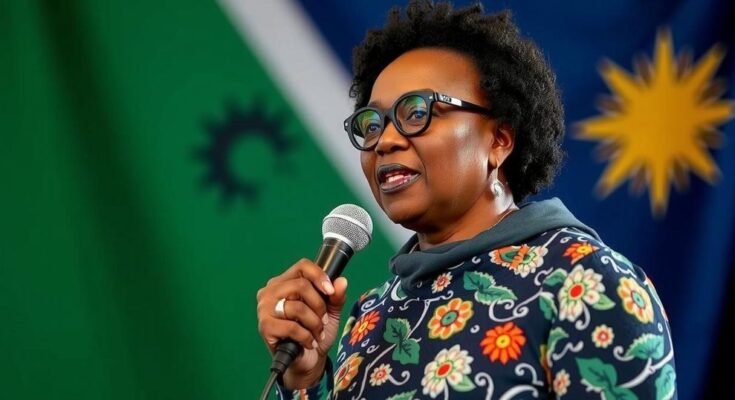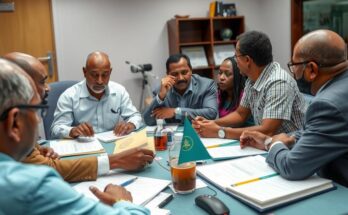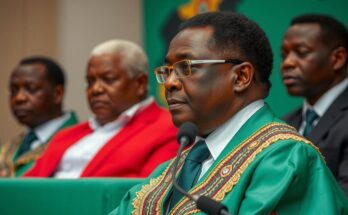Netumbo Nandi-Ndaitwah has been elected as Namibia’s first female president with 57% of the vote, extending Swapo’s 34-year rule. Despite opposition challenges regarding electoral irregularities, Nandi-Ndaitwah’s victory is historically significant and reflects long-standing stability, contrasting with regional trends of political upheaval.
Namibia has made history by electing its first female president, Netumbo Nandi-Ndaitwah, following a controversial presidential election. The current vice-president secured victory with 57% of the vote, solidifying the ruling Swapo party’s longstanding dominance that dates back 34 years to the nation’s independence from South African apartheid in 1990. Nandi-Ndaitwah expressed her gratitude, stating, “The Namibian nation has voted for peace and stability,” following the announcement of the results.
Her political career is notable; she was part of the independence movement in Namibia during the 1970s, serving as foreign minister before her promotion to vice-president after the untimely death of President Hage Geingob. Notably, opposition parties have contested the election results due to various technical issues, including ballot shortages, which led to an extension of the voting period.
Panduleni Itula, a political newcomer and former dentist, finished second with 25.5% of the vote, down from the nearly 29% he previously achieved in the last elections. Swapo’s performance also declined, receiving just over 53% of the parliamentary vote compared to 65% five years ago. Nandi-Ndaitwah is viewed as a stabilizing figure within her party, largely untouched by previous corruption allegations. Her election stands in contrast to recent electoral trends in southern Africa where ruling parties are facing significant challenges from younger voters demanding change.
The presidential election in Namibia has considerable implications as it highlights the interplay of political stability, historical governance, and emerging electoral trends in southern Africa. Swapo has been the governing party since Namibia gained independence in 1990, providing a political backdrop for Nandi-Ndaitwah’s leadership. Characterized by significant youth dissatisfaction towards incumbent parties across the region, the elections have sparked debates regarding the legitimacy of the electoral process, particularly due to allegations of irregularities raised by opposition groups. Thus, Nandi-Ndaitwah’s victory signifies a potential continuation of established governance amid rising public demand for accountability and reform.
In summary, Namibia’s recent presidential election has resulted in the historic election of Netumbo Nandi-Ndaitwah as the first female president. While this victory underlines the ruling Swapo party’s enduring influence, it is accompanied by a backdrop of significant opposition dissatisfaction and claims of electoral malpractice. The outcome reflects both the resilience of established political structures and the complex demands of an evolving electorate, positioning Nandi-Ndaitwah in a pivotal role heading forward.
Original Source: www.theguardian.com




